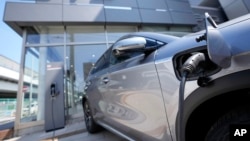Osamu Furukawa has driven lots of Japanese cars for his business converting classic gasoline-powered models to electric. But his favorite ride is an import: A battery-powered SUV from China's BYD Auto.
BYD Auto is part of a wave of Chinese electric car exporters that are starting to compete with Western and Japanese brands in their home markets. They bring fast-developing technology and low prices that Tesla chief financial officer says "are scary."
Furukawa said he ordered an ATTO 3 when it went on sale January 31, for its user-friendly features and appealing price of $33,000 — or about one-quarter less than a Tesla.
"It's perfect," Furukawa said in his office in Yokohama, southwest of Tokyo.
Other ambitious Chinese EV exporters include NIO, Geely Group's Zeekr and Ora, a unit of SUV maker Great Wall Motors.
Some compete on price. Others emphasize performance and features, putting pressure on Western and Japanese premium brands.
NIO, which has persuaded buyers in China to pay Tesla-level sticker prices of up to $80,000, says its latest SUV goes on sale this year in Europe. The ES6 boasts voice-activated controls and a range of 610 kilometers on a charge.
"We are very confident the ES6 will compete in this premium SUV market," NIO's founder and CEO, William Li, said in an interview at the Shanghai auto show.
Sales of battery-powered vehicles and gasoline-electric hybrids in China almost doubled last year to 6.9 million vehicles, or half the global total.
That was supported by multibillion-dollar subsidies from the ruling Communist Party, which is trying to make China a creator of clean energy and other technologies. That rattles U.S. and European leaders who see China as a strategic and industrial competitor.
Chinese brands are "serious competition," according to David Leah, an analyst for GlobalData.
They have "more competitive battery technology" and can "achieve greater economies of scale," Leah said in an email.
BYD Auto, owned by battery maker BYD Co., edged ahead of Tesla in total 2022 sales at 1.9 million vehicles. Half were gasoline-electric hybrids, while Tesla's fleet is pure electric.
"We have a lot of respect for the car companies in China," Tesla CEO Elon Musk said in a January 25 conference call with financial analysts. "They work the hardest and they work the smartest."
Chinese brands are developing EVs to compete without subsidies as Beijing shifts the burden to the industry by requiring them to earn credits for selling electrics. Prices start as low as $14,500 for a compact SUV with a 400-kilometer range on one charge.
"The Chinese are scary," Tesla CFO Zachary Kirkhorn said on the analyst call.
Chinese EV brands mix research and design centers in the United States and Europe with factories in China.
Geely's Zeekr plans to launch an all-electric sedan and an SUV this year in the Netherlands and Sweden. Its mini-United Nations of Chinese and European designers is in Gothenberg, Sweden, adjacent to Volvo Cars, another Geely brand, while its factories are in China.
"Our ambition is to be a key player in electrified mobility in Europe within this decade," said Zeekr CEO Spiros Fotinos, a Toyota and Lexus veteran. With a "clear global ambition," he said, "we're looking at the opportunities and right timing for other markets."
CEO Carlos Tavares of Stellantis, the parent company of Chrysler, Peugeot and FIAT, warned in January that Europe needs a strategy to compete with China's lower prices. European-made electrics cost 40% more than Chinese models, according to Tavares.
"It's a very bleak scenario," Tavares told German magazine Automobilwoche. "But it doesn't have to go that way."
BYD Auto's exports quadrupled last year to 55,916 sedans, SUVs and hatchbacks. Most went to India, Thailand, Brazil and other developing markets. BYD announced a 1,000-vehicle sale last year to Mexico's VEMO for the biggest EV taxi fleet outside China.
State-owned BAIC, headquartered in Beijing, said a dealer in Jordan ordered 1,000 units of its compact EU5 sedan in January. The company said it plans to launch two to three more electric vehicles in Latin America, Southeast Asia and Europe.
What about the United States, the biggest, richest market?
Chinese EV brands are skittish about a sprawling country that demands big investments in dealerships and charging networks, especially while Washington and Beijing are feuding over security, technology and human rights.
SEE ALSO: A related video by VOA's Keith Kocinski
"This is not an easy task," said NIO's Li. "Our products and services need to be prepared."
BYD Auto has been in the U.S. market for a decade selling battery-powered transit buses assembled at a factory northeast of Los Angeles. It is "still in the process" of deciding whether to sell SUVs and sedans to Americans, the company said in a written response to questions.
Political tensions "make it difficult for a Chinese company to launch, EV or otherwise," in the United States, Leah said.
In Europe, Great Wall's Ora sells its 03 model starting at $20,000. Ora tries to stand out among dozens of fledgling brands by marketing its cars as being designed for women, their body sizes and daily needs.
"This is a second or third car for a household. It can be used by a wife or daughter to commute to work, to go out with friends or to go shopping," said Ora's deputy general manager, Tan Jian.
In Europe, BYD Auto has partnerships with dealership chains in Britain, Sweden, Germany and the Netherlands. The company says it also has delivered cars in Belgium, Denmark and Austria. It has a deal with European rental company SIXT that BYD says will lead to sales of up to 100,000 vehicles over the next six years.
In Japan, BYD Auto plans to have 100 showrooms by the end of 2025. Its Dolphin hatchback and Seal sedan are due to hit the Japanese market this year. The company says it also has exported some 4,000 ATTO 3s to Australia.









